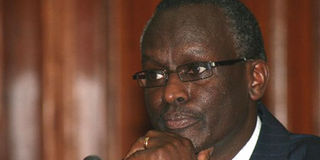Lobby fails to block PS nominees

Justice Isaac Lenaola. FILE
What you need to know:
- The judge said there was nothing wrong in the short-listing and interviewing by the Public Service Commission and that their job, according to the law was to recommend names to the President.
- The judge, however, ruled that the lobby group had not proved whether there was any law requiring the commission to conduct the interviews in public or publicise the names of those it selected.
President Uhuru Kenyatta has been given the green light to nominate principal secretaries after a case challenging the short-listing of candidates was dismissed.
Justice Isaac Lenaola ruled that the petition by the Consumers Federation of Kenya was speculative and a premature invocation of the Constitution.
The judge said there was nothing wrong in the short-listing and interviewing by the Public Service Commission and that their job, according to the law was to recommend names to the President.
“The role of the commission is only one in a chain of events,” Justice Lenaola ruled.
The consumer’s lobby had argued that the commission conducted interviews in violation of the Constitution by refusing to consider public participation.
They argued that the decision to “secretly” recommend to the President names of successful candidates was unconstitutional.
According to the lobby, denying the public information on which 66 names were forwarded to the President was a breach to their right to public information.
They also claimed that several current permanent secretaries, who expressed interest to continue in office, were denied the chance without reasonable grounds, causing them humiliation and loss of self-esteem.
The judge, however, ruled that the lobby group had not proved whether there was any law requiring the commission to conduct the interviews in public or publicise the names of those it selected.
“The Public Service Commission regularly briefed the public at press conferences on the procedure they used in conducting the interviews and recording proceedings on video which anyone can access if they so wish,” Justice Lenaola said.
On the issue of “participation of the people”, the judge ruled that the clause should not be read to mean that people must be present during interviews but that any information received from the public is enough public participation. “The people are represented in Parliament and the Constitution provides that the people may exercise their sovereignty through their elected leaders,” he added.




